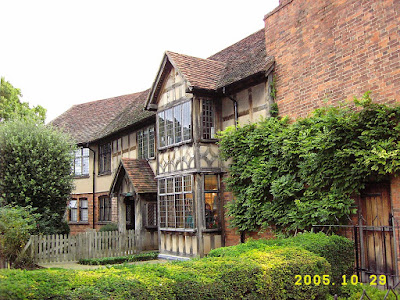 Shakespeare's House in Stratford-on-Avon
Shakespeare's House in Stratford-on-Avon

Read Peter Ackroyd's Shakespeare: the Biography
Most of Shakespeare’s education in Stratford will have centred on English and Latin grammar. The study related to drama, as Peter Ackroyd explains:
1. In the first year, students studied the Short Introduction of Grammar, in which William Lily “explained the simple grammatical formulations, and then illustrated them with examples from Cato[1], Cicero or Terence” (54)
2. Within the second year, “the test in collections of phrases, aphorisms and commonplaces” would have been good at training Shakespeare’s “art of remembrance,” which “proved fruitful in his later career as an actor” (55). In the second year, he would also have been directed “to selections from the plays of Plautus and Terence, dramatic episodes that may have quickened his own dramatic spirit. In his account of the proper education for Children Erasmus recommends that the master take his pupils through a complete play by Terence, noting the plot and the diction. The master might also explain ‘the varieties of Comedy’”[2] (55).
3. In the third year, “Shakespeare would have been able to compose English into Latin and to translate Latin to English” (56). He would have been taught to imitate the great originals that might have “inspired [the] act of adaptation and assimilation. In later life Shakespeare rarely invented any of his plots, and often lifted passages verbatim from other books” (56).
4. “In succeeding years, in the classroom above the guildhall, he [would have] studied Sallust and Caesar, Seneca and Juvenal[3]. Hamlet is found reading from the tenth satire of Juvenal, which he dismisses as ‘words, words, words’” (57).
5. “The final stages of Shakespeare’s education were perhaps the formative ones. He [would have] moved from grammar to oratory, and learned the arts of elocution. What we call creative writing, the Elizabethan called rhetoric. . . . He [would] also [have] learned how to avoid hyperbole and false rhetoric; in his plays, he gave them to his comic characters. . . . Rhetoric, and the devices of rhetoric, then become a form of creation” (58). In addition, the school would also have instructed that Shakespeare should “‘utter every dialogue lively, as if [he himself was the person who] did [speak] in that dialogue.’[4] It is a good training for the theatre” (59)
留言